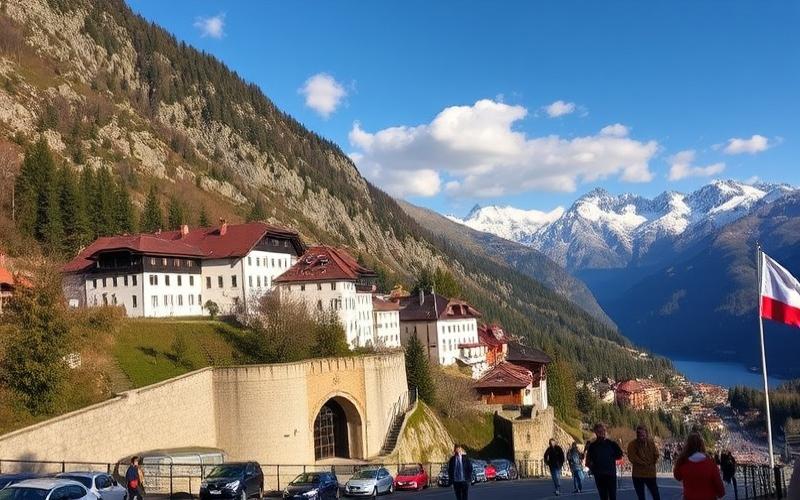
 Published on and written by Cyril Jarnias
Published on and written by Cyril Jarnias
With its picturesque Alpine landscapes and robust economy, Liechtenstein stands as a prime destination for expatriates seeking to explore overseas real estate investment opportunities. Although this small country often feels more like a fairy tale than reality, it’s surprising how appealing its attractive tax benefits and exceptional quality of life are. However, navigating Liechtenstein’s real estate market requires a thorough understanding of its specific regulations and local practices, making it essential to prepare well before diving into this unique environment.
Understanding the Legal Framework for Real Estate for Expatriates in Liechtenstein
Key Real Estate Regulations and Laws in Liechtenstein Affecting Expatriates:
- Foreign Ownership Restrictions: The acquisition of real estate by foreigners is heavily regulated. Generally, only permanent residents with prior authorization can purchase property. For non-residents or those without permanent residency permits, direct purchase remains very limited and exceptional.
| Status | Right to Direct Acquisition |
|---|---|
| Permanent Resident | Yes (with authorization) |
| Non-Resident | Very limited/exceptional |
- Specific Eligibility Criteria: A residence permit is essential for a foreign national to acquire property. Residency typically requires effective residence in the country for at least three years. EU/EFTA nationals employed in Liechtenstein or companies needing commercial premises may benefit from certain exceptions.
Property ownership does not automatically grant the right to residency or citizenship.
Required Steps to Purchase or Invest in Real Estate in Liechtenstein:
- Obtain a valid residence permit.
- Justify a minimum period of residence (typically three years).
- Submit an official application to the relevant local authorities for specific authorization related to the property acquisition.
- In some cases, demonstrate a legitimate professional or family interest based on the type of property sought.
- Finalize the transaction before a notary and register the transfer with the local land registry.
Tax Specifics Related to Real Estate Purchases by Non-Residents:
- Expatriates are subject to local taxation on their worldwide income if they become Liechtenstein tax residents.
- Capital gains from resale are taxed unless specific exemptions apply (e.g., reductions for quick sale after departure).
- Since 2019, full exemption may apply under certain conditions upon permanent departure.
- Rental income from furnished properties exceeding certain thresholds may shift taxation to a business regime, even without formal registration as a local company.
For EEA/Swiss/UK nationals receiving real estate income from their home country, they remain subject to local social contributions but may benefit from specific exemptions.
Tax Advantages/Disadvantages for Expatriate Investors:
Advantages
- Potential exemption on certain capital gains under conditions
- Favorable regime with effective establishment and local tax recognition
Disadvantages
- Strict and restrictive procedures
- Progressive taxation on worldwide income for tax residents
Legal Consequences of Non-Compliance:
- Possible cancellation of the real estate transfer
- Significant administrative and financial penalties
- Increased risk when repatriating funds from illicit operations
Recommended list:
- Engage a local attorney specialized in international real estate law from the start to:
- Precisely identify eligibility
- Properly prepare the required administrative file
- Secure each contractual step with the relevant authorities
- Also consult:
- A real estate agent familiar with Liechtenstein’s specific international regulations
- A tax advisor who can anticipate all consequences related to bilateral agreements between countries
It is essential that any expatriate wishing to invest in or acquire property in Liechtenstein consistently seeks advice from local experts before any concrete steps to ensure full compliance with the strict legislation in force!
Good to Know:
In Liechtenstein, expatriates must navigate a strict legal framework for real estate investment, with significant restrictions on foreign ownership. Non-residents often need to obtain government authorization to acquire property, a process that may involve conditions related to use or resale. Tax-wise, real estate purchases entail specific impositions, such as transfer taxes, often higher for non-residents. Non-compliance with these regulations can result in fines or even cancellation of the purchase. To avoid these pitfalls, it is highly recommended to seek assistance from local experts, such as attorneys specialized in real estate law or real estate agents experienced in international transactions. These professionals can not only provide an understanding of local laws but also guide you through complex administrative procedures, facilitating a more secure and compliant investment.
Administrative Procedures for Acquiring Real Estate as an Expatriate
Legal Conditions:
- Purchasing real estate in Liechtenstein by foreigners is possible but subject to strict conditions.
- Prior acquisition of a residence permit is mandatory for non-residents wishing to buy property.
- A specific real estate acquisition permit must be obtained after a thorough financial evaluation to prevent speculative purchases and ensure market stability.
- National land rules apply uniformly to all types of properties (residential and commercial).
Purchase Process:
- Property Search
- Identify the type of property sought (apartment, house, commercial space).
- Review listings or use a real estate agent.
- Negotiation
- Contact the seller.
- Negotiate price and conditions.
- Application for Necessary Permits
- Prepare the file for the specific permit application with local authorities.
- Cadastral Verification
- Systematic consultation of the cadastral register to ensure transparency on ownership.
- Drafting and Signing the Preliminary Contract
- Private contract prepared in agreement with all parties.
- Finalization with the Notary
- Official signing before a notary who authenticates the deed and registers the transaction with the competent authorities.
Required Documents:
- Valid identification (passport)
- Residence permit or current proof
- Official proof of sufficient funds (bank statement)
- Evidence proving financial stability
- Administrative application for the special real estate acquisition permit
- Signed preliminary contract
Role of Notaries:
Notaries are indispensable in any real estate acquisition in Liechtenstein: they draft, verify, and then authenticate the official deed—their intervention ensures maximum legal security and correct registration in the national cadastral system.
The notarial process protects both buyer and seller against any hidden defects or future disputes regarding the legally recognized transfer of ownership.
Without a duly registered notarial deed, no transfer is legally valid in this country.
Taxation and Fees:
| Type | Amount/Method |
|---|---|
| Acquisition/Transfer Taxes | Variable percentage based on declared value |
| Administrative Fees | To be expected during procedures with authorities |
| Cadastral Fees | Paid upon registration in the land registry |
Expatriates must also verify their international tax situation to avoid any potential double taxation.
Recommended Professional Assistance:
- Local specialized real estate agents
- Lawyers expert in international real estate law/notarial legalization
- Accountants/tax advisors familiar with local/international taxation
Typical Time & Costs:
| Step | Average Timeframe | Estimated Costs |
|---|---|---|
| Search/Negotiation | 2 to 8 weeks | Depending on agent |
| Administrative File | 3 to 6 weeks | Fixed fees |
| Notary & Registration | A few days after final authorization | % of purchase value (~1%–3%) |
Possible additional fees: agency commission (generally between 2% and 4%), bank fees if loan/mortgage is taken.
Professional guidance from the initial steps is highly recommended to secure each administrative or financial stage during a real estate acquisition in Liechtenstein by an expatriate.
Good to Know:
In Liechtenstein, expatriates must comply with strict laws, often requiring prior authorization for purchasing real estate. The process begins with searching for suitable properties and negotiating prices, followed by signing a final sales contract under the supervision of a notary, ensuring the transaction’s legal security.
Financial Involvement in Overseas Real Estate: Tax Aspects and Financing
Financial Involvement in Liechtenstein Real Estate: Tax Aspects, Financing, and Regulations
Acquiring real estate in Liechtenstein presents notable specifics regarding taxation, financing, and banking regulation. Here are the essential points for a foreign investor to consider.
Local Taxation Applicable to Real Estate Purchases
- Property Tax: Liechtenstein applies an annual property tax on holding real estate. Its rate varies by municipality and property type.
- VAT (Mehrwertsteuer): The sale of residential real estate is generally not subject to VAT, except for certain new or commercial properties.
- Registration Fees: Real estate purchase involves paying registration fees to the land registry.
- Real Estate Capital Gains: Disposal may generate taxation on capital gains based on holding period and seller’s status.
International Tax Conventions
Liechtenstein has tax conventions aimed at avoiding double taxation with several European countries. These agreements determine in particular:
- The competent country for taxing rental income or capital gains realized by a non-resident
- Mechanisms allowing foreign investors to obtain credits or exemptions in their home country
| Signatory Country | Types of Income Covered | Possible Credit/Exemption |
|---|---|---|
| France | Real estate income, capital gains | Yes |
| Germany | Real estate income | Yes |
| Switzerland | All types | Yes |
Specific Tax Incentives for Foreign Investors
Liechtenstein’s tax regime is known for stability but offers very few specific incentives exclusively targeting foreign investors in residential real estate. However:
- Mechanisms may exist for certain strategic economic activities (e.g., hotels).
- Tax conventions sometimes limit the overall impact of levies in cross-border investments.
Local Financing Options and Conditions
To finance a real estate purchase in Liechtenstein, several solutions are available:
Local Mortgage Loans
- Accessible subject to solid guarantees; initial deposit generally required between 20% and 40% of total price
- Minimum amount often high (e.g., CHF 25,000 to CHF 1 million depending on institution)
Applicable Rates
Rates vary based on borrower profile, duration, and loan amount; they remain comparable to those in neighboring Switzerland due to strong macro-financial stability.
Banking Regulation
Liechtenstein banks are strictly regulated by the Financial Market Authority (FMA):
- Enhanced anti-money laundering standards
- Thorough verification of financial sources during initial deposits
- Deposit insurance up to CHF 100,000 per client
Common Documentary Requirements
Indicative list:
- Valid passport
- Official proof of main residence
- Documented evidence of lawful origin of invested funds
For investing from abroad, it is advisable to:
- Open a dedicated bank account in Liechtenstein to facilitate local/multi-currency payments.
- Regularly consult your national tax advisor to ensure all declarative obligations are met with your home country.
- Be accompanied by an independent lawyer expert in cross-border law during significant transactions to avoid any incompatibility between respective national regulations.
Key Takeaways
Liechtenstein’s financial environment combines advanced legal security, increased transparency in recent years regarding international standards against tax evasion/anti-money laundering, and a premium banking offer suited to wealthy international clients. To optimize your investment tax-wise while respecting your transnational obligations: always prioritize personalized advice before final commitment.
Good to Know:
Investing in real estate in Liechtenstein requires an understanding of local tax specifics. The country does not impose a direct property tax, but the standard VAT of 7.7% applies to real estate transactions. Tax conventions between Liechtenstein and other countries can reduce or eliminate double taxation, which is advantageous for expatriates. In terms of financing, local mortgage loans are available, often with a 20% deposit and fixed or variable interest rates around 1.5% to 2.5%. Banking regulations require full disclosure of foreign income and assets, and consulting a currency expert is advised to reduce risks related to monetary fluctuations. Investors must also consider regulatory differences between their home country and Liechtenstein to maximize benefits and maintain legal compliance.
Real Estate Investment Strategies for Expatriates in Liechtenstein
Liechtenstein’s real estate market offers attractive investment opportunities, notably due to its economic stability, rigorous regulatory environment, and a local preference for residential ownership.
Types of Properties Available
- Single-family homes
- Mixed-use buildings (residential and commercial)
- Highly demanded office spaces
- Vacation homes
The majority of properties are owner-occupied, reflecting a local culture favoring homeownership over renting.
Tax Regulations and Specific Laws for Expatriates
- Foreign nationals must obtain a residence permit before acquiring real estate.
- Only 28 properties can be purchased annually by non-citizens; this limit directly affects available supply.
- EU/EFTA nationals must reside in Liechtenstein for three years before accessing property ownership.
- The land system is strictly controlled: mandatory registration, high transparency, and enhanced legal security.
| Aspect | Personal Use | Rental Investment |
|---|---|---|
| Access for Expatriates | Subject to strict conditions | Same; annual quotas very limiting |
| Tax Advantages | Low taxes on capital gains | Attractive taxation on rental income |
| Challenges | Limited supply; high prices in some neighborhoods | Access difficulty; strict regulations on leasing |
| Personal Involvement | Simpler if primary residence | Rental management required, often delegated |
Profitable Investment Strategies
Prioritize central neighborhoods or those near Vaduz where demand remains high.
Favor purchasing in the mid-to-high-end segment, which has seen constant appreciation for several decades.
Diversify with mixed-use buildings allowing flexibility between residential and commercial leasing.
Tip: Foreign investors should anticipate a lengthy but secure administrative process thanks to the meticulous land registry.
Recommended Promising Areas
- Vaduz (capital): economic and political heart
- Schaan: dynamic industrial hub, immediate proximity to Vaduz
- Balzers & Eschen: sought-after residential areas with growth potential
Remote Property Management – Practical Tips
- Rely on local companies specialized in property management ensuring legal compliance
- Use digital tools for financial tracking (rents received, charges…)
- Plan appropriate insurance covering vacancy or damages
Cultural & Economic Aspects Influencing the Market
Liechtenstein exhibits:
- A strong cultural attachment to family real estate ownership
- Exceptional political stability attracting cautious investors
- A robust financial sector favoring safe investments
Tax and Legal Optimization for Expatriates
Structuring the purchase via a local holding company can allow tax optimization while respecting the country’s legal framework.
Benefit from low corporate tax rates if investing through a dedicated legal entity.
Systematic consultation with local tax advisors is recommended to avoid any non-compliance.
Remember: The Liechtenstein market is distinguished by its structural scarcity combined with great security. Thus, expatriates benefit from strong protection but must navigate a particularly selective regulatory environment.
Checklist:
- Verify eligibility based on nationality/residence
- Target central or dynamic mixed areas (Vaduz/Schaan)
- Prepare complete administrative file from the project’s start
- Anticipate professional remote management if prolonged absence
Good to Know:
Liechtenstein offers expatriates a stable real estate market with investment opportunities in residential and commercial properties, particularly in areas like Vaduz and Schaan. It is crucial to understand market specifics, including advantageous tax regulations that include exemptions for non-resident investors. For personal use purchases, expatriates should be aware of property taxes, while rental investment presents challenges in terms of remote management, often requiring a local manager. Profitable strategies include acquiring high-yield housing in developing neighborhoods. In terms of tax law, optimization is possible through double taxation conventions between Liechtenstein and various countries. Culturally, language and local business practices can influence the purchasing experience, making it essential to collaborate with local real estate agents to adapt to market particularities.
Disclaimer: The information provided on this website is for informational purposes only and does not constitute financial, legal, or professional advice. We encourage you to consult qualified experts before making any investment, real estate, or expatriation decisions. Although we strive to maintain up-to-date and accurate information, we do not guarantee the completeness, accuracy, or timeliness of the proposed content. As investment and expatriation involve risks, we disclaim any liability for potential losses or damages arising from the use of this site. Your use of this site confirms your acceptance of these terms and your understanding of the associated risks.
























